
Your Metro, The Way Forward
En Español | Community Toolkit Resources |
Executive Summary
![]() |
Strategic Transformation Plan
|
Strategic Transformation Plan
![]()
Annual Transformation Report ![]()
Over the next 5 years, we have enacted a plan to transform one of the nation's largest mass transit systems and propel it into the next era of transportation.
Your Metro, The Way Forward provides the long-term strategy for us to reach our vision of becoming the region's trusted way to move people safely and sustainably. It'll also direct our day-to-day decision-making and includes the guiding values, mission, and vision for Metro along with the goals, objectives, and supporting initiatives to achieve this. It also focuses on four goals related to service excellence, talented teams, regional opportunity and partnership, and sustainability.
Read the entire plan.
Goal 1. Service Excellence
We'll deliver safe, reliable, convenient, equitable, accessible, and enjoyable service for customers.
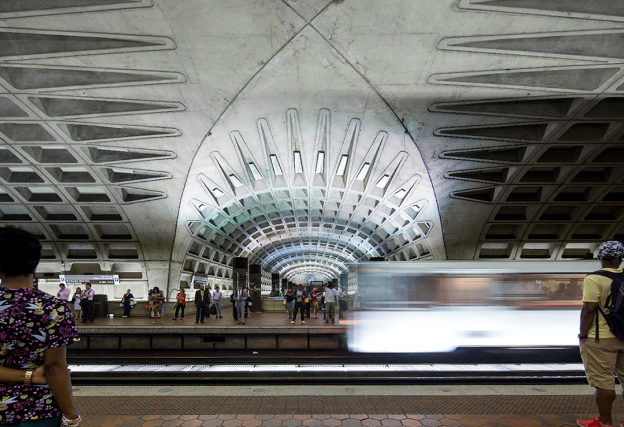
Goal 2. Talented Teams
We'll attract, develop, and retain top talent where team members feel valued, supported, and proud of their contribution.
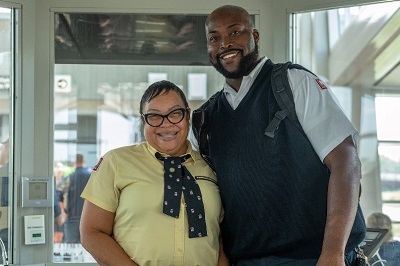
Goal 3. Regional opportunity and partnership
We'll design transit service to move more people and equitably connect a growing region.

Goal 4. Sustainability
We'll manage resources responsibly to achieve a sustainable operating, capital, and environmental model.

![]()
How are we doing? Check our progress
Metro is already putting the Strategic Transformation Plan into action. Check back with us when we launch a dashboard to showcase our ongoing projects occurring across the system.
Plan Initiatives already underway:
- Better Bus Network Redesign
- Sustainability Efforts including Zero-Emissions Bus Garage & Solar Carport Projects
- Fare System Modernization
- Metrorail service improvements
- Bus shelter improvements
- Elevator, escalator & canopy renovations
- Metropolitan (DC) Police Department Partnership
- Keep up to date with our news as it happens

Strategic Transformation Plan Timeline
As part of its public participation process, Metro solicited feedback from hundreds of customers, community stakeholders, government leaders, and employees across the system in 2022. Metro's Board of Directors incorporated public input and finalized the Strategic Transformation Plan in February 2023.
Read more:
Board Approval |
Public Input Report |
Notice of Public Hearing

Goal 1: Service Excellence
We aim to deliver safe, reliable, convenient, equitable, accessible, and enjoyable service for customers.
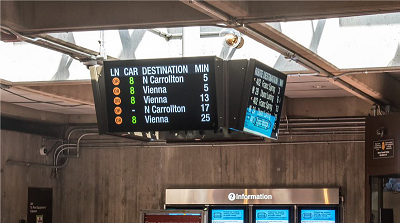
Customer feedback makes it clear that riders want safe, reliable, convenient, equitable, accessible, and enjoyable service.
To improve service throughout the system, Metro has established three objectives:
- Safety and security
- Reliability
- Convenience
These objectives are being accomplished by improving existing programs and introducing new initiatives. We measure progress through a mix of performance metrics (e.g., on-time performance) and your customer satisfaction through surveys. Detailed information on the key performance indicators can be found in Appendix A.
-
Safety and security
Our safety and security objective is to ensure all customers and employees feel safe and secure using and delivering services.
To achieve alleviating customers feeling less safe and secure, we will:
- 1. Increase our public orderliness and safety programs vis-à-vis our Metro Transit Police Department, Rail Advisory Committee, and Youth Council to increase passenger and employee safety and perceptions of safety across the system.
- 2. Install safety-oriented station and bus stop infrastructure to improve passenger safety like our new faregates.
- 3. Enhance operational safety for employees from injury and assault.
- 4. Implement our Safety Management System (SMS) to create a formal, organization-wide, data-driven approach to proactive safety risk management, assuring effectiveness of safety risk mitigations, building a positive safety culture, and reducing safety incidents.
-
Reliability
Our reliability objective is to provide dependable service that the community trusts.
To achieve customers trusting in us that we are reliable we will:
- 1. Repair and modernize infrastructure and equipment to minimize time in maintenance, number of failures, and improve operational reliability.
- 2. Implement reliability-centered maintenance using advanced analytics, imagery, and other tools to improve and coordinate preventative maintenance.
- 3. Improve operational effectiveness to deliver better service and improve maintenance with minimal disruption.
- 4. Complete the implementation of a Quality Management System (QMS) and continue to monitor outcomes to better coordinate and direct activities.
- 5. Modernize signal infrastructure to allow for more consistent and efficient rail operation.
-
Convenience
Our objective related to customer convenience is to deliver frequent and accessible service that modernizes and enhances the customer experience.
To achieve having customers feel that Metro is convenient, we will:
- 1. Modernize and enhance end-to-end customer experience for user-friendliness and attractiveness.
- 2. Optimize service and scheduling across system to improve frequency of service and allow for seamless transfers.
- 3. Improve customer service and communications strategy to solicit consistent input and provide proactive, frequent, and real-time support to customers.
- 4. Modernize station operations to streamline station management/operations to deliver consistent, high-quality service across network.
- 5. Expand last-mile connectivity options to provide safe accessible routes to transit and critical amenities for bicyclists (secured parking, bikeshare, scootershare, e-bikes, etc.) and pedestrians.
Our near-term objectives will be to:
- Improve reliability of real time bus tracking information
- Increase number of 7000-series trains in operation
- Enhance customer experience
- Improve wayfinding and digital signage
- Integrate customer call center
- Expand last-mile connectivity

Goal 2: Talented Teams
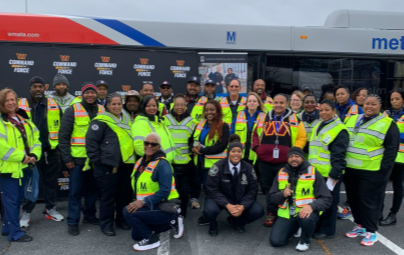
We aim to attract, develop, and retain top talent where individuals feel valued, supported, and proud of their contribution.
With the large, specialized workforce required to support today's service and tomorrow's challenges, effective recruitment, hiring, and employee development practices are key to providing quality service at Metro.
To achieve this goal, we are focusing on three areas:
- Recruitment and retention
- Engagement, empowerment, and recognition
- Professional and technical skill development
-
Recruitment and retention
We aim to attract and retain the best talent at all levels of the organization to deliver Metro's future vision.
Preliminary initiative programs include:- 1. Develop strategic workforce planning to close talent and skill gaps through recruiting, retraining, and/or upskilling.
- 2. Execute recruiting and hiring strategy to develop additional talent pools, increase access to candidates, and reduce vacancies.
- 3. Establish employee value proposition to establish Metro as a great place to work, develop careers, increase overall satisfaction, and have a positive impact in recruitment and retention.
- 4. Implement succession planning to provide continuity to the business and reduce uncertainty among staff.
-
Engagement, empowerment, and recognition
We aim to empower employees and promote effective collaboration and continuous culture improvement so employees feel supported, recognized, and engaged.
Specifically we aim to:
- 1. Develop culture change strategy to increase engagement across the organization.
- 2. Implement Diversity, Equity, and Inclusion (DEI) strategy and programs to ensure Metro provides opportunities and representation to all cohorts and lead implementation of agency's Racial and Social Equity Strategy.
- 3. Create an innovation incubator to empower people with innovative ideas and foster creativity and innovation. Rewarding and recognizing those who put forth noteworthy ideas that improve safe operations, increase efficiencies, improve processes, and reduce silos.
- 4. Establish a performance evaluation framework that supports engagement and recognition across the organization.
- 5. Implement realignment and business process improvement by identifying resource needs, clarifying decision rights and accountabilities, eliminating duplication, and reducing inefficiencies.
- 6. Develop internal customer service strategy to enable better collaboration and positively impact external customer service.
-
Professional and technical skill development
We will invest in staff to expand career pathways and develop the next generation of Metro leaders and technical skills experts. Specifically we will:- 1. Create talent / career / skills development plans that provide attractive work experiences and expands career opportunities across Metro.
- 2. Establish center of excellence training academy to provide staff with the right skills and capabilities that Metro's operations require.
- 3. Provide leadership development and applied training programs to support emerging leaders and develop the next generation of Metro leaders.
Our near-term objectives will be to:
- Expand talent pool through part-time jobs, apprenticeship programs, and partnerships with universities and technical and trade schools
- Develop competency framework and redefine career paths
- Strengthen recognition efforts across the organization
- Establish new office focused on Diversity, Equity, and Inclusion

Goal 3: Regional Opportunity & Partnership
We aim to design transit service to move more people and equitably connect a growing region.
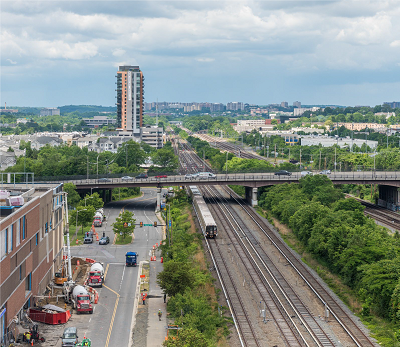
Metro expects partnership and community engagement to continue to improve, translating to higher monthly ridership. Progress will be measured through several metrics focused on frequency and convenience (e.g., percent of bus customer trips with 12 minutes or better frequency, average number of jobs accessible within 30 minutes on Metro) and indicators of partnership (e.g., percent of contracted dollars for small, female or minority-owned businesses).
Detailed information on the metrics for the Regional Opportunity and Partnership goal can be found in Appendix A.
To achieve this goal, we are focusing on two areas:
- Regional Network and Partner Service Optimization and Transit Equity
- Community Partnership and Engagement
-
Regional Network and Partner Service Optimization and Transit Equity
We aim to align regional service networks, fare and service policies and supporting infrastructure to increase convenience, use of transit, equity in the region, and the role equity plays in Metro's decision making.
Preliminary initiative programs include:- 1. Initiate Metrorail service optimization to increase core frequency and enable efficient transfers where most customers are riding.
- 2. Implement Better Bus network redesign to realign and expand bus service to best serve customers where and when they need to travel.
- 3. Reevaluate fare policy to make fares simple and affordable to promote access to transit, while delivering improvements to Metro's payment system for easier access to transit.
- 4. Focus on customer-centric regional mobility to streamline customer information across services to provide a better experience and increase regional transit use.
- 5. Establish transit equity advancement and policy actions to improve access to opportunity and quality of life for the region's historically disenfranchised residents and communities.
-
Community Partnership and Engagement
We aim to collaborate with regional partners to promote economic growth, enhance access, and foster sustainable community development that supports ridership recovery & resiliency.
Preliminary initiative programs include: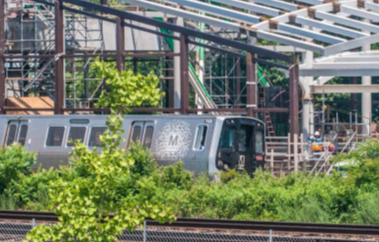
- 1. Accelerate Transit oriented development (TOD) more densely and accelerate development near transit
- 2. Program service capacity capital investments to make forward-thinking investments that increase Metro's capacity to expand transit service in the region.
- 3. Proactively engage with the community to deepen and expand Metro's relationships with customers and foster a sense of shared ownership in regional transit services.
Our near-term objectives will be to:
- Implement more frequent service on Green, Yellow, and Orange lines
- Develop and select a plan for the Blue, Orange, and Silver Line Corridor Redesign and implement bus network(s)
- Implement simplified fare structure
- Launch low-income fare program
- Establish housing production & affordability goals for stations & high-capacity bus corridors that maximizes ridership potential
- Create economic development plans for select stations to grow counter-commute potential
- Adopt policy to right-size parking and bus facilities to accelerate transit-oriented development (TOD) on Metro properties
- Establish community relations office
- Engage seniors, low-income, and other groups to maximize awareness of products
- Build directory for new Minority Business Enterprise (MBE) program
- Hold "Meet the Primes" training programs for businesses to learn about opportunities

Goal 4: Sustainability
We aim to manage resources responsibly to achieve a sustainable operating, capital, and environmental model.
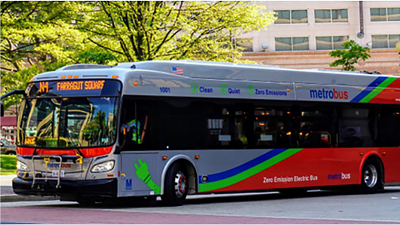
Getting more people to ride Metro not only reduces roadway safety issues but is the best way to cut down on travel-related carbon emissions in our region.
Detailed information on the initiatives and metrics for the sustainability goal can be found in Appendix A.
To deliver sustainability outcomes tactically, Metro has defined two objectives for this goal:
- Financial sustainability
- Environmental sustainability
-
Financial sustainability
We aim to establish dedicated, ongoing, regional funding to support multi-year operating and capital plans and steward public investment.
Preliminary initiative programs include:
- 1. Secure dedicated, ongoing, regional, non-fare, non-subsidy funding stream(s) to increase funding and resources supporting projected/optimal service and related capital investments.
- 2. Update subsidy formula and jurisdictional funding model to increase focus on servicing the region's and customers' needs.
- 3. Optimize advertising strategy to increase non-fare revenue through more relevant and visible ads for riders and non-riders via outdoor digital displays (e.g., at station entrances, buses, etc.), corporate partnerships, or other revenue opportunities.
- 4. Expand non-fare, non-advertising revenue to better utilize existing spaces in stations/lines to drive revenue (e.g., station commercialization/retail, joint development, and parking leases).
- 5. Improve asset management and cost-effective sourcing of materials and contract services to be a better steward of resources and service delivery to modernize and reduce costs.
- 6. Mitigate fare evasion to increase fare revenue and reduce instances of passengers boarding without paying fare or tapping free ride program cards.
-
Environmental sustainability
We aim to take action to combat climate change, adapt to its impacts, and steward natural resources.
In 2019-2020, Metro helped the DMV avoid nearly 300,000 metric tons of CO2 emissions,14 the equivalent of taking more than 65,000 cars off the road.

Preliminary initiative programs include:- 1. Decarbonize Metro infrastructure and equipment to eliminate use of fossil fuels from Metro business through carbon-free energy sources such as solar power utilization, and a transition to zero emission vehicles.
- 2. O ptimize natural resource stewardship to protect, conserve, and enhance places where Metro operates (including promoting recycling, greenspace, water and stormwater management and other sustainable practices).
- 3. Modernize design, construction, and operations to meet sustainability and climate resiliency challenges (including pursuing green certifications for buildings).
Our near-term objectives will be to:
- Pursue state & local budget approvals of new dedicated funding sources for transit operations and capital investments
- Pursue regulatory approvals and permits to allow outdoor advertising at Metro properties & station entrances
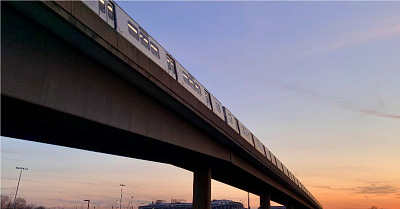
- Pursue portfolio funding solution to accelerate joint development feasibility
- Monetize assets by offering leasing opportunities for retail, parking, and bike facilities
- Deploy new anti-fare evasion gates and displays at demonstration stations
- Strengthen policies, procedures, and data dashboards to identify cost saving opportunities, improve cost controls, and manage financial resources more efficiently
- Adopt decarbonization strategy
- Complete solar carport installation and commissioning at several stations Improve rider recycling
- Launch climate resiliency program
- Pursue green certifications for three new administrative buildings and first certified transit station